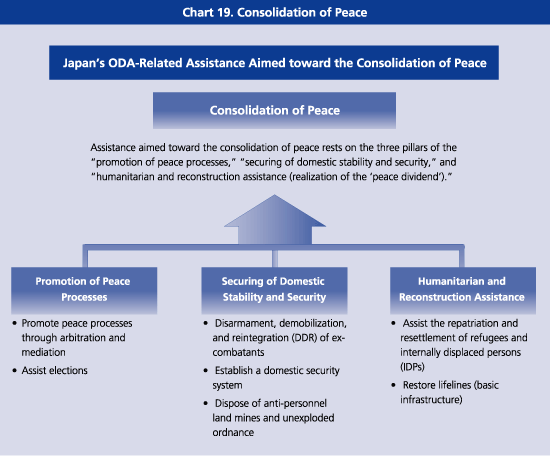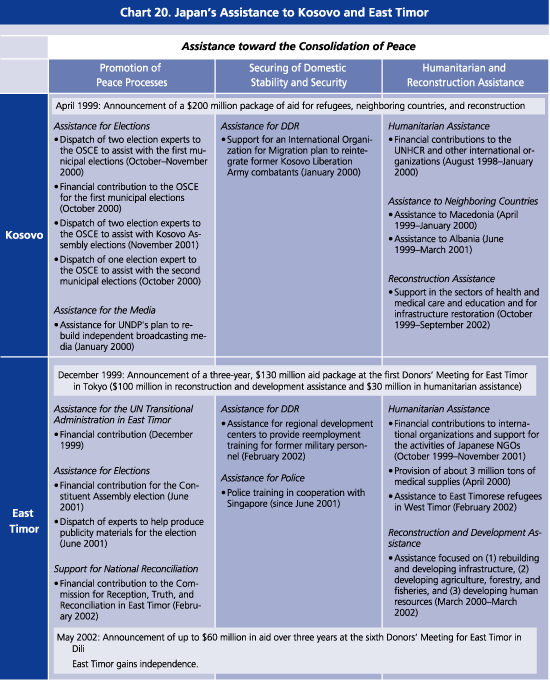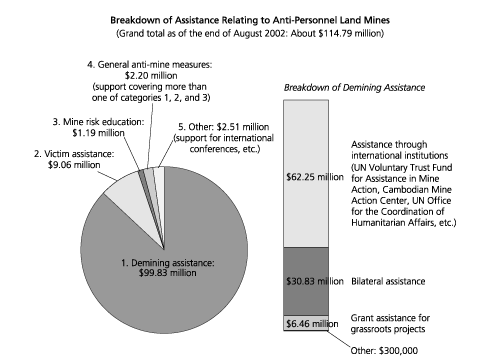Official Development Assistance (ODA)
Japan's ODA White Paper 2002
Part I. Trends in Japan's ODA in a Rapidly Changing World
Chapter 2
Section 3. Cooperation for the Consolidation of Peace and Nation Building
- In May 2002 Prime Minister Koizumi announced Japan's intention to "strengthen cooperation for the consolidation of peace and nation building in countries suffering from conflict. This policy has become a new pillar of Japan's international cooperation."
- Japan has been making concrete efforts to promote the peace process, restore security, and provide humanitarian and reconstruction assistance in Timor-Leste, Afghanistan, Sri Lanka, Aceh in Indonesia, and Mindanao in the Philippines.
Since the end of the Cold War, there has been an outbreak of conflicts due to such factors as religion and ethnicity. One salient feature of armed conflict in recent years is that as many as 80% of the casualties are civilians (noncombatants). While armed conflict itself causes humanitarian crises, they also can instantly wipe out the results of development efforts made over many years and result in huge economic losses. Unrest and conflict have even destroyed the basic structure of the state, with the result that some countries and regions like Timor-Leste and Afghanistan were left without a government or with a seriously weakened one (so-called failed states). Assistance to such states has become a key international issue.
Although political and diplomatic efforts to prevent or resolve conflicts are the first steps that must be taken, development assistance can also play an important role in this context. In 2000 Japan announced "Action from Japan on Conflict and Development," which provides comprehensive support through ODA in ways that help alleviate hardship?including poverty reduction measures, assistance for basic human needs (BHN), and restoration of basic infrastructure?at all stages of the conflict cycle, from conflict prevention to emergency humanitarian assistance, support for recovery and reconstruction plans, prevention of conflict recurrence, to full-scale development aid.
In a policy speech in Sydney in May 2002, Prime Minister Junichiro Koizumi, referring to the experience of regional conflicts in Kosovo, Timor-Leste, and Afghanistan, expressed Japan's intention to "strengthen cooperation for the consolidation of peace and nation building in countries suffering from conflict." Noting, "this policy has become a new pillar of Japan's international cooperation," he emphasized Japan's determination to actively support post-conflict peace building in particular.
One prominent and grand achievement of cooperation within the international community including Japan was the independence of East Timor (renamed Timor-Leste) in May 2002. (See Chart 20 for details on support for Timor-Leste.)
This section begins with a detailed examination of Japan's support for the consolidation of peace and nation building and the efforts made to date, followed by a description of Japan's comprehensive efforts in assisting Afganistan. Also described are Japan's efforts to make active use of ODA to support peace efforts in Sri Lanka, Aceh in Indonesia, and Mindanao in the Philippines.
(1) Consolidation of Peace and Nation Building
Promoting the Peace Process To achieve permanent resolutions to regional conflicts, it is important to provide assistance even before the conflict ends to consolidate the growth of peace. One way of doing this is to host peace and reconstruction conferences and to promote the peace process, such as through the establishment of legitimate governments by election. Japan hosted the First Consultative Group Meeting for Cambodia in 1996 and the Consultative Group Meeting for East Timor in 1999, and in January 2002 it hosted the International Conference on Reconstruction Assistance to Afghanistan.
When there are signs that a conflict is nearing its end, Japan actively works to encourage and consolidate peace by indicating to the conflicting parties that ODA may be provided as soon as the conflict comes to a complete halt. One example was the hosting of the Preparatory Conference on Peace and Reconstruction in Aceh, held in Tokyo in December 2002. Japan is also playing a leading role in the peace and reconstruction process in Sri Lanka, appointing former UN Under Secretary General Yasushi Akashi as the Japanese Government Representative to the country and expressing its readiness to host a Consultative Group Meeting in June 2003.
Elections serve an extremely important role in the fragile domestic political environment immediately following the cessation of conflict. Since supporting Cambodia's election in 1998, Japan has dispatched election monitors and supervisory personnel and offered funds, equipment, and other forms of assistance for elections in Kosovo, East Timor, Mozambique, Fiji, and the Solomon Islands.
Restoring Stability and Domestic Security In many post-conflict countries, the domestic security situation is extremely poor and is thus an obstacle to reconstruction and development. Progress in the peace process between conflicting parties must therefore be paralleled by measures to swiftly restore stability and security. Such measures include UN peace-keeping operations (PKOs) or operations to restore stability and order by multinational forces; the establishment of a domestic security system (the creation of a police system); the disposal of antipersonnel mines and unexploded ordnance (UXO); and the disarmament, demobilization, and reintegration (DDR) of former soldiers. Japan provides ODA for mine clearance and to support land-mine victims while also providing support through multilateral organizations - such as the Trust Fund for Human Security, which Japan established within the United Nations - for DDR activities in Kosovo, Timor-Leste, and Sierra Leone.
The number of land mines buried worldwide is reported to be in the tens of millions and may be as high as 100 million. These are concentrated especially in areas beset by long-term conflicts, such as Afghanistan and Cambodia. Land mines are not only causing extremely serious humanitarian problems by inflicting indiscriminate injury and death on noncombatants, including women and children, but are also major impediments to reconstruction and development in post-conflict situations.
Efforts by the international community to confront the problem of land mines gained momentum from the early 1990s at the urging of the International Committee of the Red Cross (ICRC) and Boutros Boutros-Ghali, then UN Secretary General. The Convention on the Prohibition of the Use, Stockpiling, Production, and Transfer of Anti-Personnel Mines and on Their Destruction (the Ottawa Convention) was opened for signature in Ottawa, Canada, in December 1997 and entered into force on March 1, 1999.
Japan signed the Convention at the signing ceremony in Ottawa and ratified it on September 30, 1998. At the signing ceremony, Japan also proposed the "Zero Victims Program" and announced assistance amounting to some ¥10 billion over five years from 1998 for mine removal and victim assistance. The target of ¥10 billion was accomplished by October 2002.
Also, as a measure to further strengthen its efforts, Japan decided that, as of August 2002, vehicles specialized for the removal of anti-personnel mines and mine detectors did not correspond to the definition of weapons as defined by the Three Principles on Arms Exports and that, therefore, such equipment was exempt from export licensing.
There is a great deal of concern among the Japanese public over the problem of land mines, and the Japanese Government, working in cooperation with international organizations and NGOs, is pursuing efforts to clear mines and assist victims. For Afghanistan, Japan has contributed funds several times since January 2002, including to the UNDP, and has also provided support to local NGOs in the form of grant assistance for grassroots projects. In addition, Japan has contributed personnel by dispatching a governmental mission composed of experts to develop the technology to detect and remove land mines, as well as personnel to the UN Mine Action Center for Afghanistan (MACA). Japan's assistance has elicited expressions of gratitude and praise from local people for their effectiveness, and expectations are high for further assistance from Japan in the future.

Humanitarian and Reconstruction Assistance The basic foundations of daily life must be recovered through humanitarian and reconstruction assistance to enable people who have suffered through years of conflict to enjoy tangible peace dividends. Japan has in recent years been actively contributing emergency humanitarian assistance, for example, by dispatching Kenzo Oshima to serve as UN Under Secretary General for the Office for the Coordination of Humanitarian Affairs (OCHA), which coordinates emergency humanitarian aid in the UN. Furthermore, Japan has been actively contributing personnel and funds, both bilaterally and through multilateral organizations like the Office of the UN High Commissioner for Refugees (UNHCR) and the International Committee of the Red Cross (ICRC) in response to a variety of humanitarian crises. Japan also places a high value on cooperation with NGOs that are able to provide prompt, fine-tuned emergency humanitarian assistance. Grants for supporting NGO emergency activities are promptly provided to Japanese NGOs engaged in humanitarian assistance. In the initial stages of reconstruction it is necessary to provide ODA more swiftly than usual. Since 1999 Japan has sent urgent rehabilitation support program teams to conflict-affected areas to carry out needs surveys, formulate short-term recovery plans, and rehabilitate urgently required facilities.
In providing humanitarian and reconstruction assistance, it is important to ensure a smooth, seamless transition from humanitarian assistance to full-scale reconstruction and development assistance. In many cases, however, the international community's interest in reconstruction and development assistance declines sharply after a certain period of time, compared with the amount of attention immediately following major conflicts or natural disasters. Moreover, because of the frequency of conflicts and natural disasters in recent times, there is a chronic shortage of funding required even for emergency humanitarian assistance.
These are the three components of the "consolidation of peace." In some cases, however, as in Timor-Leste and Afghanistan, unrest and conflict have destroyed not only the economic infrastructure but also the basic structure of the state, including political and social systems, leaving countries and regions with no government or with a seriously weakened government. In such cases, the three components must be combined with support for nation building, that is, the building of the basic institutions in a broad range of areas, such as politics, economics, education, the media, human rights, and gender issues.



